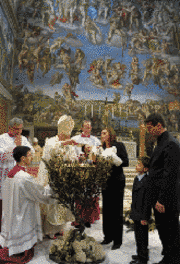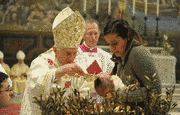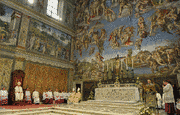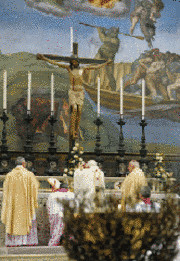Feast of the Baptism of the Lord 2012
- Flash is required!
Pope Benedict XVI's Homily at Holy Mass
+ the administration of the Sacrament of Baptism in the Sistine Chapel
Sunday, 8 January 2012 - in English, French, German, Italian, Portuguese & Spanish
"Dear Brothers and Sisters,
It is always a joy to celebrate this Holy Mass with the baptism of children on the Feast of the Baptism of the Lord. I greet you all with affection, dear parents, godparents and all of you, relatives and friends! You have come here — you said so aloud — so that your newborn babies may receive the gift of God’s grace, the seed of eternal life. You, parents, have desired this. You thought of Baptism even before your child was born. Your duty as Christian parents made you think immediately of the Sacrament that marks entry into divine life and into the community of the Church. We can say that this was your first educational decision as witnesses of the faith to your children: it is a fundamental decision!
The parents’ task, helped by the godfather and godmother, is to raise their son or daughter. Raising children is very demanding and at times taxes our human capability, which is always limited. However, educating becomes a marvellous mission if it is carried out in collaboration with God who is the first and true educator of every human being.
In the first reading, we heard from the Book of the Prophet Isaiah, God addresses his people precisely as a teacher. He puts the Israelites on their guard against the danger of quenching their thirst and appeasing their hunger at the wrong sources: “Why”, he says, “do you spend your money for that which is not bread, and your labour for that which does not satisfy?” (Is 55:2). God wants to give us good things to drink and to eat, things that do us good; whereas at times we use our resources mistakenly, we use them for things that are useless, indeed, even harmful. Above all, God wants to give us Himself and His Word. He knows that in distancing ourselves from Him we will soon run into difficulty — like the prodigal son of the parable — and, especially, that we will lose our human dignity. And for this reason he assures us that He is infinite mercy, that His thoughts and ways are unlike ours — fortunately! — and that we can always return to him, to the Father’s house. Thereafter He assures us that if we receive His Word it will bear good fruits in our life, like the rain that waters the earth.
We responded to these words which the Lord has addressed to us through the Prophet Isaiah with the refrain of the psalm: We will “draw water joyfully from the springs of salvation”. As adults, we have striven to draw from the good springs for our own good and for the good of those entrusted to our responsibility, and you in particular, dear parents and godparents, for the good of these children. And what are “the springs of salvation”? They are the Word of God and the Sacraments. Adults are the first who must nourish themselves at these sources, so as to be able to guide those who are younger in their development. Parents must give much, but in order to give they need in turn to receive, otherwise they are drained, they dry up. Parents are not the spring, just as we priests are not the spring. Rather, we are like channels through which the life-giving sap of God’s love must flow. If we cut ourselves off from His spring, we ourselves are the first to feel the negative effects and are no longer able to educate others. For this reason we have committed ourselves by saying: We will “draw water joyfully from the springs of salvation”.
And we now come to the second reading and to the Gospel. They say that the first and principal education takes place through witness. The Gospel speaks of John the Baptist. John was a great educator of his disciples, because he led them to the encounter with Jesus to whom he bore witness. He did not exalt himself, he did not wish to keep his disciples bound to him. Yet John was a great prophet, his fame was very great. When Jesus arrived John drew back and pointed to him: “After me comes he who is mightier than I…. I have baptized you with water; but he will baptize you with the Holy Spirit” (Mk 1:7-8). The true teacher does not bind people to himself, he is not possessive. He wants his son or daughter, or disciple, to learn to know the truth and to establish a personal relationship with it. The educator does his duty fully, he assures his attentive and faithful presence because his objective is that the person being educated listen to the voice of truth speaking to his heart and follow it on a personal journey.
Let us return once again to the witness. In the second reading, the Apostle John writes: “And the Spirit is the witness” (1 Jn 5:7). He is referring to the Holy Spirit, the Spirit of God, who bears witness to Jesus, testifying that he is the Christ, the Son of God. This is also apparent in the scene of the Baptism in the River Jordan: the Holy Spirit descends upon Jesus as a dove to reveal that he is the Only-Begotten Son of the eternal Father. In his Gospel too, John underlines this aspect where Jesus says to the disciples: “When the Counselor comes, whom I shall send to you from the Father, even the Spirit of truth, who proceeds from the Father, he will bear witness to me; and you also are witnesses, because you have been with me from the beginning” (Jn 15:26-27). This is a great comfort to us in the work of educating in faith, because we know that we are not alone and that our witness is sustained by the Holy Spirit.
It is very important for you parents, and also for the godparents, to believe strongly in the presence and in the action of the Holy Spirit, to invoke him and to welcome him within you, through prayer and through the sacraments. It is he, in fact, who illumines the mind and warms the heart of the educator so that he or she can pass on the knowledge and love of Jesus. Prayer is the first condition for teaching because by praying we prepare ourselves to leave the initiative to God, to entrust children to Him, who knows them before and better than we, and who knows perfectly what their true good is. And at the same time, when we pray we listen to God’s inspiration in order to do our part well, which in any case is our duty and which we are bound to do. The Sacraments, especially the Eucharist and Penance, enable us to carry out our educational action in union with Christ, in communion with him and continuously renewed by his forgiveness. Prayer and the Sacraments obtain for us that light of truth thanks to which we are able to be at once tender and strong, gentle and firm, silent and communicative at the right time, admonishing and correcting in the right way.
Dear friends, let us therefore all invoke the Holy Spirit together so that he may come down upon these children in abundance, consecrate them in the image of Jesus Christ and always go with them on their journey through life. Let us entrust them to the motherly guidance of Mary Most Holy, so that they may grow in age, wisdom and grace and become true Christians, faithful and joyful witnesses of God’s love. Amen."
Papa Benedetto's words at the Angelus
- in English, French, German, Italian, Portuguese & Spanish
"Dear Brothers and Sisters,
Today we are celebrating the Feast of the Baptism of the Lord. This morning I conferred the Sacrament of Baptism on 16 infants and for this reason I would like to offer a brief reflection on the fact that we are children of God. First of all, however, let us start with our being, quite simply, children: this is the fundamental condition that brings us all together. We are not all parents, but we are certainly all children. Being born is never a choice, we are not asked first whether we wish to be born. Yet, in life, we can develop a free attitude with regard to life itself: we can regard it as a gift and, in a certain sense, “become” what we are: children. This transition marks a turning point of maturity in our existence and in our relationship with our parents, which is filled with gratitude. It is a transition that also renders us capable in turn of being parents, not biologically, but morally.
Also before God we are all children. God is at the origin of the existence of every creature and is Father in a singular way to every human being: he has a unique, personal relationship with him or with her. Each one of us is wanted and loved by God. And also in this relationship with God, we can be 'reborn', so to speak, in other words become what we are. This happens through faith, through a profound and personal "yes" to God as the origin and foundation of our existence. With this “yes” I receive life as a gift of the Father who is in Heaven, a Parent whom I do not see but in whom I believe and whom, in the depths of my heart, I feel is my Father and the Father of all my brethren in humanity, an immensely good and faithful Father. On what is this faith in God the Father based? It is based on Jesus Christ: he himself and his history reveal the Father to us, enable us to know him as much is possible in this world. Believing that Jesus is the Christ, the Son of God, makes it possible to be “born from above”, that is, from God, who is Love. Moreover, let us bear in mind once again that no individual makes him or herself a human being. We are born without doing anything ourselves, the passivity of being born precedes the activity of what we ourselves do. It is also the same at the level of being Christian: no one can become Christian solely by one’s own will, being Christian is also a gift that comes before our own action: we must be reborn in a new birth. St John says: “to all who received him... he gave power to become children of God” (Jn 1:12). This is the meaning of the Sacrament of Baptism. Baptism is this new birth that precedes our own action. With our faith we can go to meet Christ, but he alone can make us Christian and give to our will and to this desire of ours the response, dignity and power to become children of God, which we ourselves do not possess.
Dear friends, this Sunday of the Baptism of the Lord brings the time of Christmas to an end. Let us give thanks to God for this great mystery which is a source of regeneration for the Church and for the whole world. God made himself the Son of Man so that man might become son of God. Let us therefore renew our joy in being children, as men and as Christians; born and reborn to a new divine existence. Born from the love of a father and a mother and reborn from the love of God through Baptism. Let us ask the Virgin Mary, Mother of Christ and of all who believe in him, to help us to live truly as children of God, not in words, or not only in words, but with deeds. St John writes further: “This is his commandment, that we should believe in the name of his Son Jesus Christ and love one another, just as he has commanded us” (1 Jn 3:23).
Dopo l'Angelus:
"Je vous salue cordialement, chers pèlerins de langue française. Alors que dans nombreux pays est célébrée, aujourd’hui, la fête de l’Épiphanie, ici, à Rome, se célèbre, celle du Baptême du Seigneur. Souvenons- nous de notre propre baptême, de ce jour où le regard du Père s’est posé sur chacun de nous, nous inondant de son Esprit et de sa vie. Le Père, désormais, nous appelle par notre nom et nous invite à témoigner de son amour infini pour tout homme. Que la Vierge Marie nous aide à offrir notre vie pour l’annonce de la Bonne Nouvelle ! Avec ma Bénédiction Apostolique !
I am happy to greet all the English-speaking pilgrims and visitors present for this Angelus prayer. In today’s feast, the Baptism of Jesus, God the Father bears witness to his only-begotten Son, and the Holy Spirit anoints him for his imminent public ministry. Let us ask for the courage to be always faithful to the life of communion with the Holy Trinity which we received in Baptism. May God bless all of you abundantly!
Von Herzen grüße ich alle deutschsprachigen Pilger und Besucher hier auf dem Petersplatz. Die Kirche feiert heute das Fest der Taufe Jesu: Am Jordan steht Christus mitten unter den sündigen Menschen als einer von ihnen, und zugleich offenbart ihn der Vater im Himmel als seinen geliebten Sohn. Durch das Sakrament der Taufe werden auch wir zu geliebten Kindern Gottes, neugeschaffen nach dem Bild Jesu Christi. Möge der Heilige Geist uns helfen, die Würde der Gotteskindschaft in der Liebe zum Herrn in allen Wirrnissen zu bewahren und in unserem Leben zu bezeugen für die anderen. Der Herr schenke euch dazu seine Gnade.
Saludo con afecto a los peregrinos de lengua española que participan en esta oración mariana. Celebramos hoy la fiesta del bautismo del Señor en el Jordán, en el que se revela el misterio del nuevo bautismo del agua y del Espíritu. Os exhorto a hacer memoria del día en que fuimos iluminados sacramentalmente en Cristo y comenzamos nuestra existencia como hijos de Dios. Que el compromiso manifestado entonces y la fe que proclamamos, no dejen de resonar en nuestros corazones y nuestras voces. Muchas gracias.
Serdeczne pozdrowienie kieruję do Polaków. Liturgia Kościoła wspomina dziś chrzest Jezusa w Jordanie. Był to gest solidarności z grzesznikami wszystkich czasów, którzy przez Jego dzieło odkupienia doznają Bożego usprawiedliwienia i miłosierdzia. Dziękujmy dziś za to, że i my mamy udział w tej tajemnicy dzięki łasce sakramentu chrztu. Niech Bóg wam błogosławi!
Rivolgo infine un caloroso saluto ai pellegrini di lingua italiana, in modo speciale alle famiglie e ai gruppi parrocchiali. A tutti auguro una buona domenica e, nuovamente, ogni bene per l’anno da poco iniziato. Buona domenica, buon anno. Auguri, grazie!"
BXVI - 8 January 2012 - © Copyright 2012 - Libreria Editrice Vaticana



